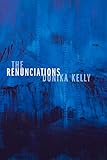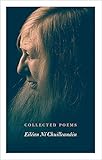Here are four notable books of poetry publishing this month.
Even Shorn by Isabel Duarte-Gray
An impressive debut that reverberates with its anchoring sense of place. The “night river is a woman washing / clean the moon / upon forgiving rocks,” Duarte-Gray writes in “Cutter Quilt,” and later wonders: “are these nails my person are they / dead apart of me the callus where / I grip my drawknife.” Western Kentucky pulses in this book, sustained by a folk sense that plays with horror and myth. Deft with the open space of the page and unafraid for lines to linger in those wide fields, Duarte-Gray creates a stunning sense of discomfort. In “Drunkard’s Path,” “My old mother kneaded bread / newborn gathered at the breast / full as circle skirt / her blue-eyed cotton lap” until a man comes home drunk, swinging, “his fists falling like / a basset skull caught the back hoof / of a unbroke horse.” These poems exist like hushed stories passed like terrible gifts across generations—the recognition that perhaps we will remain scarred: “Took me time to learn you can’t heal in body.”
The Renunciations by Donika Kelly
 With an expansive voice that is always tethered to the craft of material of stanzas and lines, Kelly creates a powerful second book. Kelly lines feel sustained by a collective voice—a perspective sometimes grammatically present within the lines, other times occupying something like a heartbeat in the charged material. “We come from abundance,” she begins one poem, “each season / bowed with rain.” She writes: “I watch the shoulder burn, / drive through the smoke that blots the mountains, / and holds the old yolk of sun.” The narrators of these poems are dizzy from pain, and seek to affirm: “Tonight, my love, we are free / of men, of gods, and I am a river // against you, drawn to current and eddy, / ready to make, to be unmade.” In addition to the rupture of childhood, Kelly also reveals the pain of separation—the longing that brings broken hearts temporarily together, and yet ultimately, “the gesture weak, / the occasion quite late.” Kelly’s past and present intermingle: “Fathers are for children,” she ends one poem, “and I was never a child, / only a smaller image of myself.” Absent of belief, her narrators ask incomplete questions and wander in mystery, and yet the wandering itself is affirmation enough: “I’ve always had: a dull knife, / a child afraid of the night and herself, // the woman you left. Still, there’s only doing / and done, the same sun, and who can remember home?”
With an expansive voice that is always tethered to the craft of material of stanzas and lines, Kelly creates a powerful second book. Kelly lines feel sustained by a collective voice—a perspective sometimes grammatically present within the lines, other times occupying something like a heartbeat in the charged material. “We come from abundance,” she begins one poem, “each season / bowed with rain.” She writes: “I watch the shoulder burn, / drive through the smoke that blots the mountains, / and holds the old yolk of sun.” The narrators of these poems are dizzy from pain, and seek to affirm: “Tonight, my love, we are free / of men, of gods, and I am a river // against you, drawn to current and eddy, / ready to make, to be unmade.” In addition to the rupture of childhood, Kelly also reveals the pain of separation—the longing that brings broken hearts temporarily together, and yet ultimately, “the gesture weak, / the occasion quite late.” Kelly’s past and present intermingle: “Fathers are for children,” she ends one poem, “and I was never a child, / only a smaller image of myself.” Absent of belief, her narrators ask incomplete questions and wander in mystery, and yet the wandering itself is affirmation enough: “I’ve always had: a dull knife, / a child afraid of the night and herself, // the woman you left. Still, there’s only doing / and done, the same sun, and who can remember home?”
Flares by Christopher Merrill
 While reflecting on his time in Slovenia, Merrill said he found a world where “poets and writers, filmmakers and artists” played a distinct role “in fomenting, prophesying, or attempting to stave off the crisis, and then in bearing witness to what they saw. This was deeply interesting to me as a poet coming from a country in which the arts have a rather marginal place. It was disorienting to be in a place where artists took center stage.” Merrill’s life as a writer has been focused on imagining a world where the storyteller’s vision matters, and that vision sustains Flares, a book that also demonstrates the narrative merit of the prose poem tradition. The vignettes arise from an itinerant eye. In “Fall and Recovery,” a safety inspector describes the concept of “crazing”: the manner of a “rack widening in the window of the plane,” the “mesh of lines spreading from the bullet-sized hole in the plastic through which shine glaciers melting in the sea below.” In the fable “Without,” a goat climbs to the top branch of an acacia tree, blares parables, and then “drifted off to sleep, unafraid of what the waxing moon might bring.” In one of the final poems, Merrill wonders: “What became of the vase of lilacs propped on the windowsill of the house tugged by a truck from one end of the street to the other?” A touching, diverse collection.
While reflecting on his time in Slovenia, Merrill said he found a world where “poets and writers, filmmakers and artists” played a distinct role “in fomenting, prophesying, or attempting to stave off the crisis, and then in bearing witness to what they saw. This was deeply interesting to me as a poet coming from a country in which the arts have a rather marginal place. It was disorienting to be in a place where artists took center stage.” Merrill’s life as a writer has been focused on imagining a world where the storyteller’s vision matters, and that vision sustains Flares, a book that also demonstrates the narrative merit of the prose poem tradition. The vignettes arise from an itinerant eye. In “Fall and Recovery,” a safety inspector describes the concept of “crazing”: the manner of a “rack widening in the window of the plane,” the “mesh of lines spreading from the bullet-sized hole in the plastic through which shine glaciers melting in the sea below.” In the fable “Without,” a goat climbs to the top branch of an acacia tree, blares parables, and then “drifted off to sleep, unafraid of what the waxing moon might bring.” In one of the final poems, Merrill wonders: “What became of the vase of lilacs propped on the windowsill of the house tugged by a truck from one end of the street to the other?” A touching, diverse collection.
Collected Poems by Eiléan Ní Chuilleanáin
 Ní Chuilleanáin has joked that she has never really suffered from writer’s block, but added “I think that my complete works in poetry would add up to something about an inch thick.” I can verify the literal truth of this observation through the book on my desk, but there’s a wealth of comedy, tragedy, and wisdom in her statement. We might write for all of our lives, and yet what we leave behind might only be measured in inches. Humbling, certainly, but perhaps also freeing. Her Collected Poems is a worthy testament to a notable life in poetry, beginning with the 1972 collection Acts and Monuments, and reaching to recent works. From that first book, “Family” glows: “Water has no memory / And you drown it in like a kind of absence.” That paradox permeates these collected works. She writes “Our history is a mountain of salt / a leaking strain under the evening cliff / it will be gone in time / grass will grow there— // not in our time.” A book to spend hours, days, years within.
Ní Chuilleanáin has joked that she has never really suffered from writer’s block, but added “I think that my complete works in poetry would add up to something about an inch thick.” I can verify the literal truth of this observation through the book on my desk, but there’s a wealth of comedy, tragedy, and wisdom in her statement. We might write for all of our lives, and yet what we leave behind might only be measured in inches. Humbling, certainly, but perhaps also freeing. Her Collected Poems is a worthy testament to a notable life in poetry, beginning with the 1972 collection Acts and Monuments, and reaching to recent works. From that first book, “Family” glows: “Water has no memory / And you drown it in like a kind of absence.” That paradox permeates these collected works. She writes “Our history is a mountain of salt / a leaking strain under the evening cliff / it will be gone in time / grass will grow there— // not in our time.” A book to spend hours, days, years within.
The post Must-Read Poetry: May 2021 appeared first on The Millions.
Source : Must-Read Poetry: May 2021








